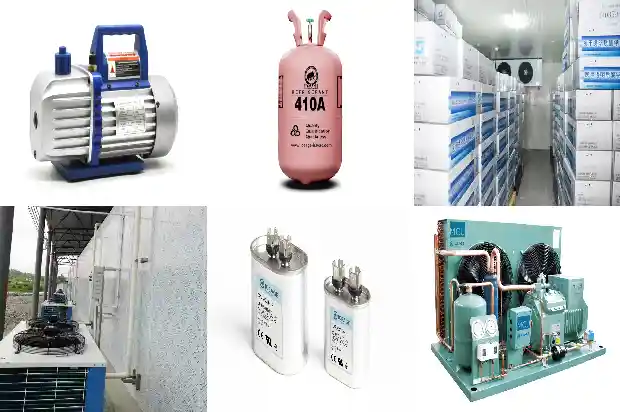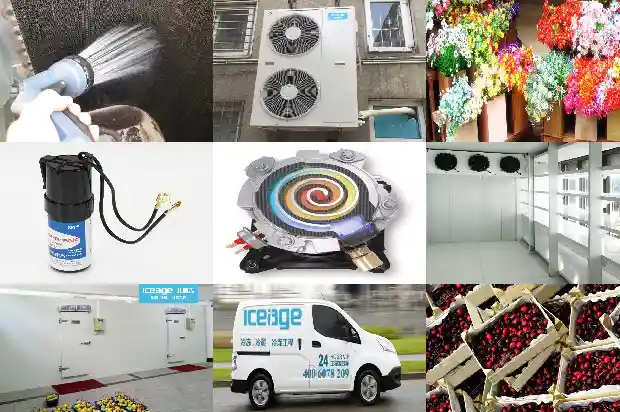Has Your Refrigeration System Experienced "Oil Carry - over"?
2025-02-11
Refrigerant may be contained in the compressor lubricating oil of a refrigeration unit. When the refrigerant gas is discharged from the compressor, some lubricating oil is carried out, which is commonly known as "oil carry - over". Especially for screw units, if the operation is improper or the oil - separation effect of the oil separator is poor, the "oil carry - over" phenomenon is more likely to occur.
It is impossible to completely avoid "oil carry - over" in the refrigeration system. However, if a large amount of lubricating oil is sucked into the compressor cylinder along with the refrigerant or is carried out in large quantities, the "oil carry - over" at this time can cause oil shortage or liquid hammer in the compressor, or lead to poor lubrication of moving parts, and damage to the compressor's valves, pistons, cylinder walls, etc.

I. The temperature of the lubricating oil is too low, and more refrigerant liquid is mixed in.
II. The temperature of the lubricating oil is too high, and the decrease in oil viscosity causes some lubricating oil to enter the compressor cylinder along with the refrigerant.

III. Too much oil is added to the crankcase, and the big end of the connecting rod in the crankcase agitates the lubricating oil to form foam.
IV. The compressor's gas delivery volume is too large or the gas delivery regulating valve is opened too wide, causing some lubricating oil to be discharged from the compressor along with the refrigerant gas.
V. Liquid refrigerant enters the crankcase and mixes with the lubricating oil. When the pressure in the crankcase decreases, the refrigerant boils and causes the lubricating oil to be carried out.
VI. There are problems with the internal components of the compressor, such as excessive clearances due to component wear.
For compressors using halogenated hydrocarbon refrigerants, a lubricating oil heater is generally installed in the crankcase. Before starting the compressor, the lubricating oil is first heated to 40 - 50℃ to evaporate the refrigerant from the lubricating oil.
Measures to deal with "oil carry - over" in the unit:
- Check the oil heater for malfunctions. If it stops heating, check and replace it.
- Increase the condensing pressure and reduce the compressor's gas delivery volume.
- Check if the amount of lubricating oil is appropriate, and the liquid level should be at the specified position.
- Close the expansion valve slightly.
- Check if the oil separator is blocked or malfunctioning.
Related Articles
- Have You Encountered the Three Common Problems of Refrigeration Compressors?
- How to Calculate Refrigeration Load? And What Are the Issues?
- What to Do if the Compressor of a Frozen and Refrigerated Display Cabinet Runs but the Refrigeration Effect Is Poor?
- Instructions for Welding and Drainage in the Installation of Refrigeration Equipment Pipelines
- Common Pressure Valves and Protection Devices in Refrigeration Units
- Precautions for Using Rotary Refrigeration Compressors
- What Misconceptions Should Be Avoided in Low - temperature Refrigeration System Repairs
- Essential for Maintenance! Parameters and Phenomena of Normal Operation of Refrigeration and Heating Systems
- Composition and Common Faults of Screw Refrigeration Compressors
- How to Read the High - and Low - Pressure Gauges of Refrigeration Air - conditioners?
- What is Cascade Refrigeration?
- Introduction to Control Valves in Refrigeration Systems
- Welding Equipment Used in Refrigeration System Maintenance
- Where Lie the Key Construction Technologies of the Ammonia Refrigeration System?
- What to Do When a Refrigeration Unit Malfunctions?
- Could a Tiny Copper Tube Cause a Multi - split Air Conditioner to Stop Cooling? Refrigeration Workers Must Pay Attention!
- Basic Knowledge of Valve - type Components in Refrigeration Systems (Technical Sharing)
- Maintenance Techniques for Air - conditioning Refrigeration Systems
